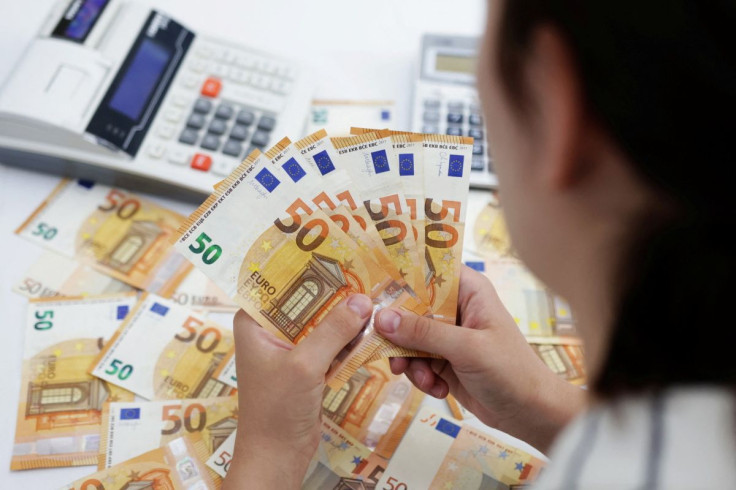Euro Knocked By Italy Crisis Ahead Of Landmark ECB Hike

The euro wilted on Thursday as the European Central Bank geared up for its first rate rise in over a decade and as political tumult in Italy offset relief following the restart of Russian gas flows through the region's largest pipeline.
Traders will have more than just the landmark rate move to juggle later, with the ECB also set to sketch out its "anti-fragmentation plan" - a bond market intervention scheme it hopes will prevent another euro zone debt crisis.
The euro had risen as high as $1.0230 overnight but fell to $1.0185 in Europe after three of Mario Draghi's Italian government coalition partners snubbed a confidence vote he had called on Wednesday to try and renew their fractious alliance.
The shared currency has enjoyed a strong week nevertheless on bets the ECB might deliver a bumper 50-basis-point (bps) rate hike later, and after Reuters reported the Nord Stream 1 pipeline would reopen on time following 10 days of maintenance.
The link's operator said flows had restarted on Thursday and Germany's network regulator indicated they were back at the pre-maintenance level of 40% capacity.
"The market has priced in, give or take, 50/50 chance of a 50 basis point ECB hike today so you would have thought you would get a reaction if it happens," said Societe Generale strategist Kit Juckes.
But he said the money markets were now pricing in 1% rates by the end of the year which might be hard to do given some difficult circumstances. They are currently at -0.5%.
"That is quite a high bar given that Italy's government is falling apart, we are still facing a winter of tight gas supplies despite Nord Stream today, and with U.S. growth slowing," Juckes added.
Graphic: Euro vs other major currencies- https://fingfx.thomsonreuters.com/gfx/mkt/egvbkxbkmpq/Pasted%20image%201658390383324.png
COLLAPSE
The European Union asked member states on Wednesday to cut gas usage by 15% until March as an emergency step after President Vladimir Putin warned that Russian supplies sent via the biggest pipeline to Europe could be reduced and might even stop.
"The risk gas is completely cut off in future because of political disputes about the Ukraine war remain, and are a weight on EUR," keeping volatility elevated, Commonwealth Bank of Australia strategist Joseph Capurso wrote in a client note.
Meanwhile, markets are split on whether ECB policymakers will deliver a previously telegraphed 25 bps increase or a half-point rise to try to wrestle down runaway inflation, despite palpable risks of recession.
The ECB, which has changed the time of its interest rate decision and post-decision news conference this month to 1215 GMT and 1245 GMT respectively, is also likely to provide more details of a new tool aimed at controlling outsized rises in borrowing cost in the euro zone's most indebted countries.
The situation has been complicated further by the looming collapse of the Italian government, with Draghi's resignation expected to lead to snap elections in early October.
Italy's markets were rattled. Benchmark 10-year Italian bonds yields soared more than 20 basis points (bps) to their highest in over 3 weeks while Italian bank shares slumped as much as 4%.
"If the ECB delivers a 25bp increase and its anti-fragmentation tool is credible, EUR should not fall too far and remain above parity," CBA's Capurso said.
Earlier, the yen shrugged off the Bank of Japan's as-expected decision to stick with ultra-easy policy settings, continuing to buck the global monetary tightening trend even as it raised its inflation forecast.
The dollar was up at 138.575 yen, consolidating below the 24-year high at 139.38 seen one week ago.
Sterling continued to drift below $1.20, last trading 0.2% lower at $1.1952, as the field of candidates vying to be Britain's next prime minister narrowed to two. The winner is not expected to be announced until Sept. 5, but the favourite to win is now Liz Truss who has said she would want more say over Bank of England decision making.
The risk-sensitive Australian dollar reversed course dipping 0.2% to $0.6875, while the New Zealand dollar did the same falling 0.5% to $0.6201.
"The big story back in April was that the commodity price boom was much more supply-led than demand but now we are seeing that roll over," Dominic Bunning, head of European FX research at HSBC said.
"There is not the strong underlying demand. There are signs growth is slowing so the positives in those economies are starting to roll over."
© Copyright Thomson Reuters 2024. All rights reserved.




















